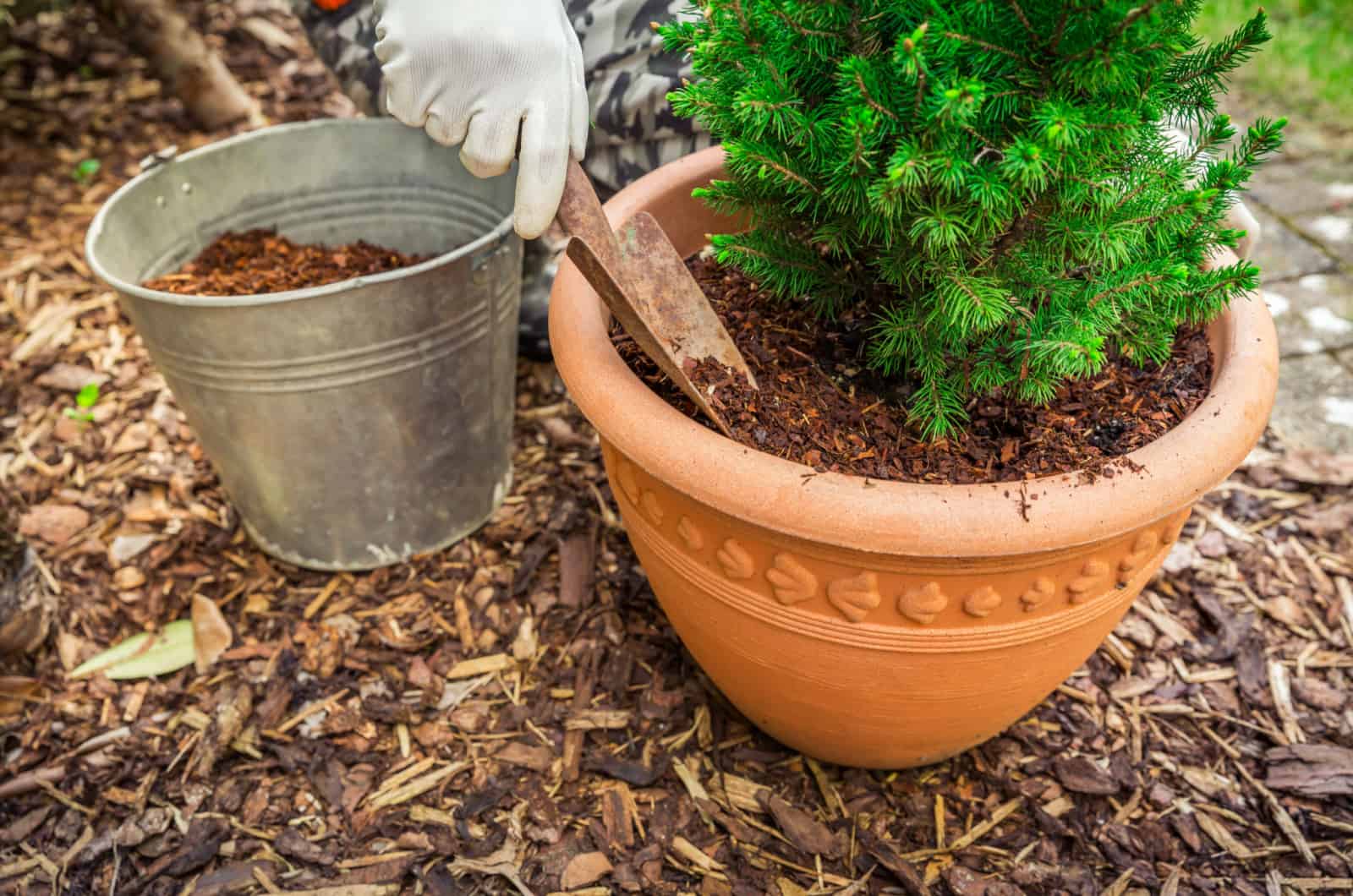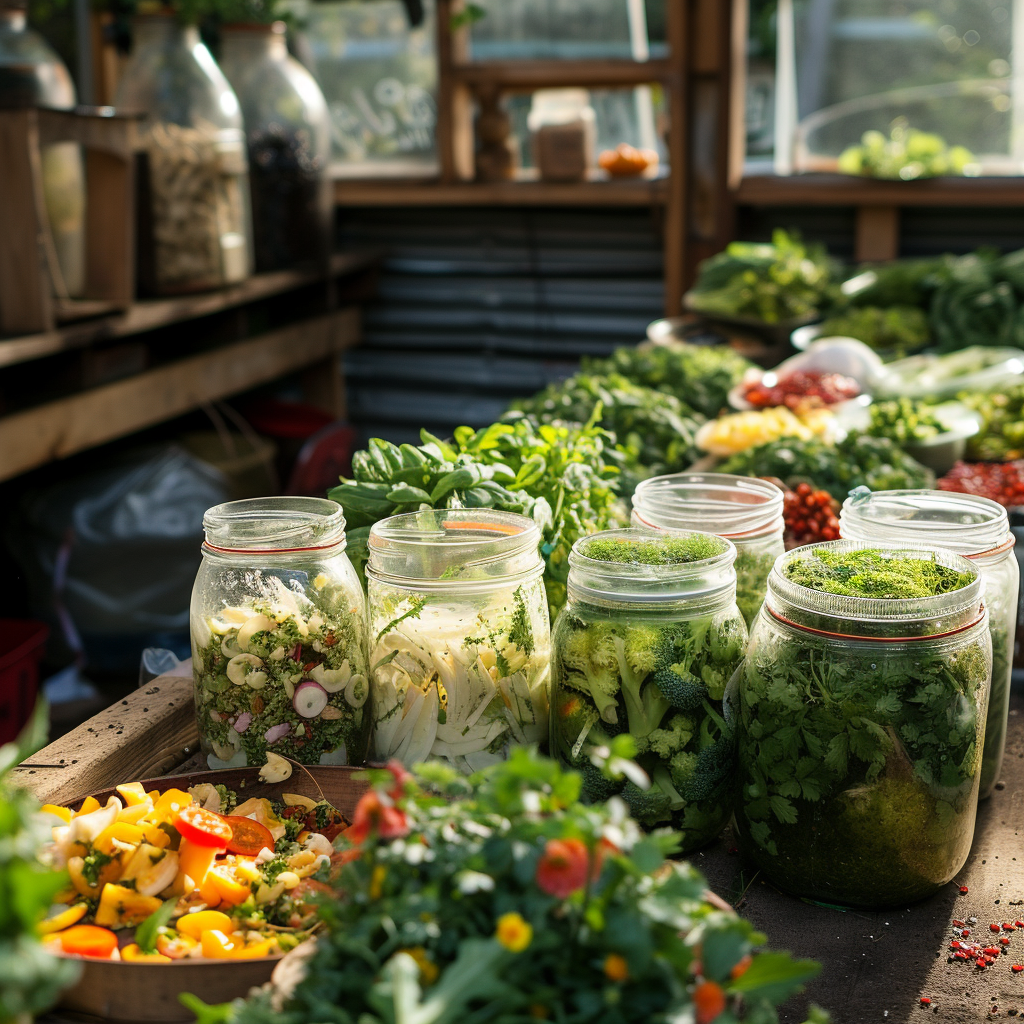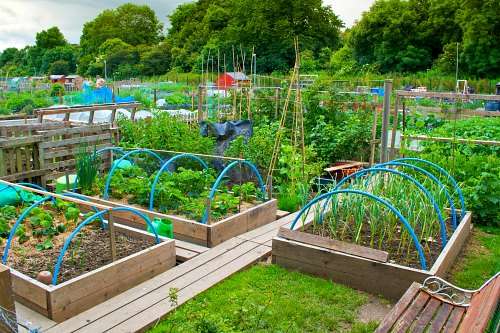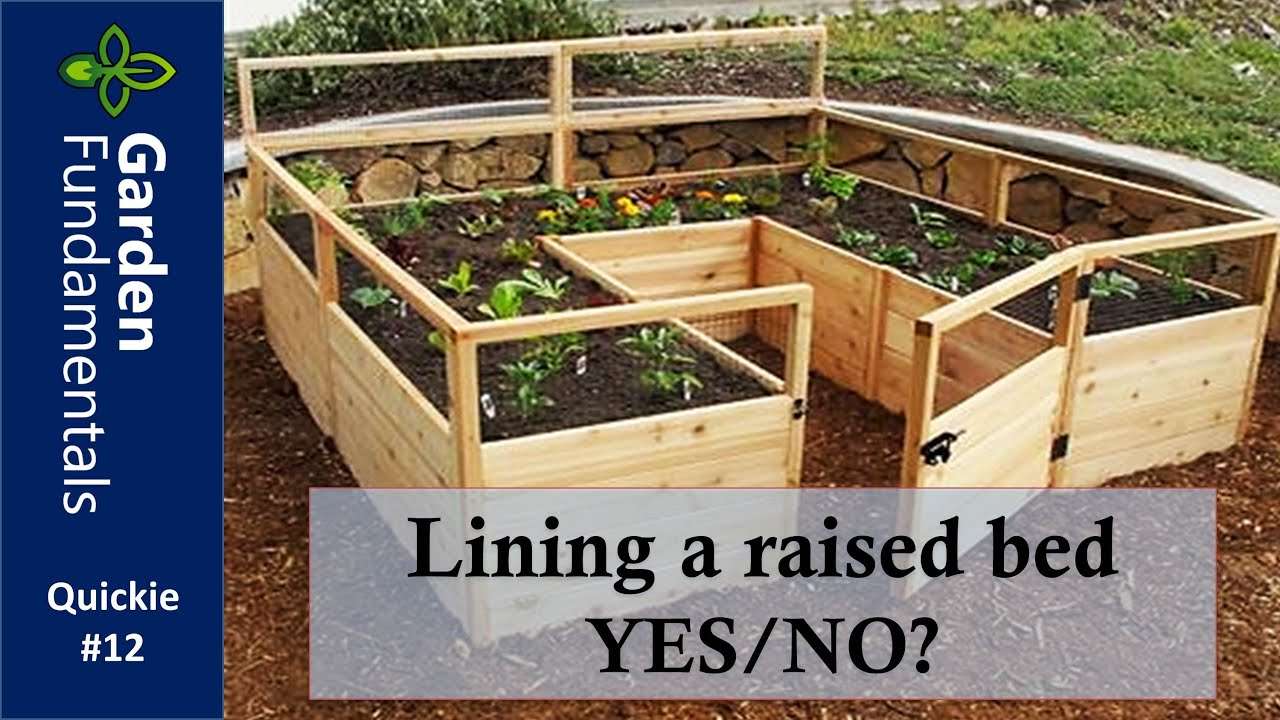Mulching potted plants is crucial for their healthy growth, and it offers a range of benefits. Not only does mulching provide the necessary nutrients for plants to thrive, but it also enhances the overall appearance of potted plants, adding an aesthetic appeal. Additionally, mulching helps retain moisture in the soil, which is essential for the proper hydration and nourishment of plants. There are various options for mulches, including grass clippings, hay, straw, wood chips, cardboard, newspaper, leaves, pine needles, compost, plastic mulch, and rubber. Each mulch has its own characteristics, advantages, and considerations. Factors such as climate, plant type, and whether the plants are indoor or outdoor should be taken into account when choosing the appropriate mulch. It is important to note that the mulch should be watered regularly and not allowed to touch the stem of the plant.
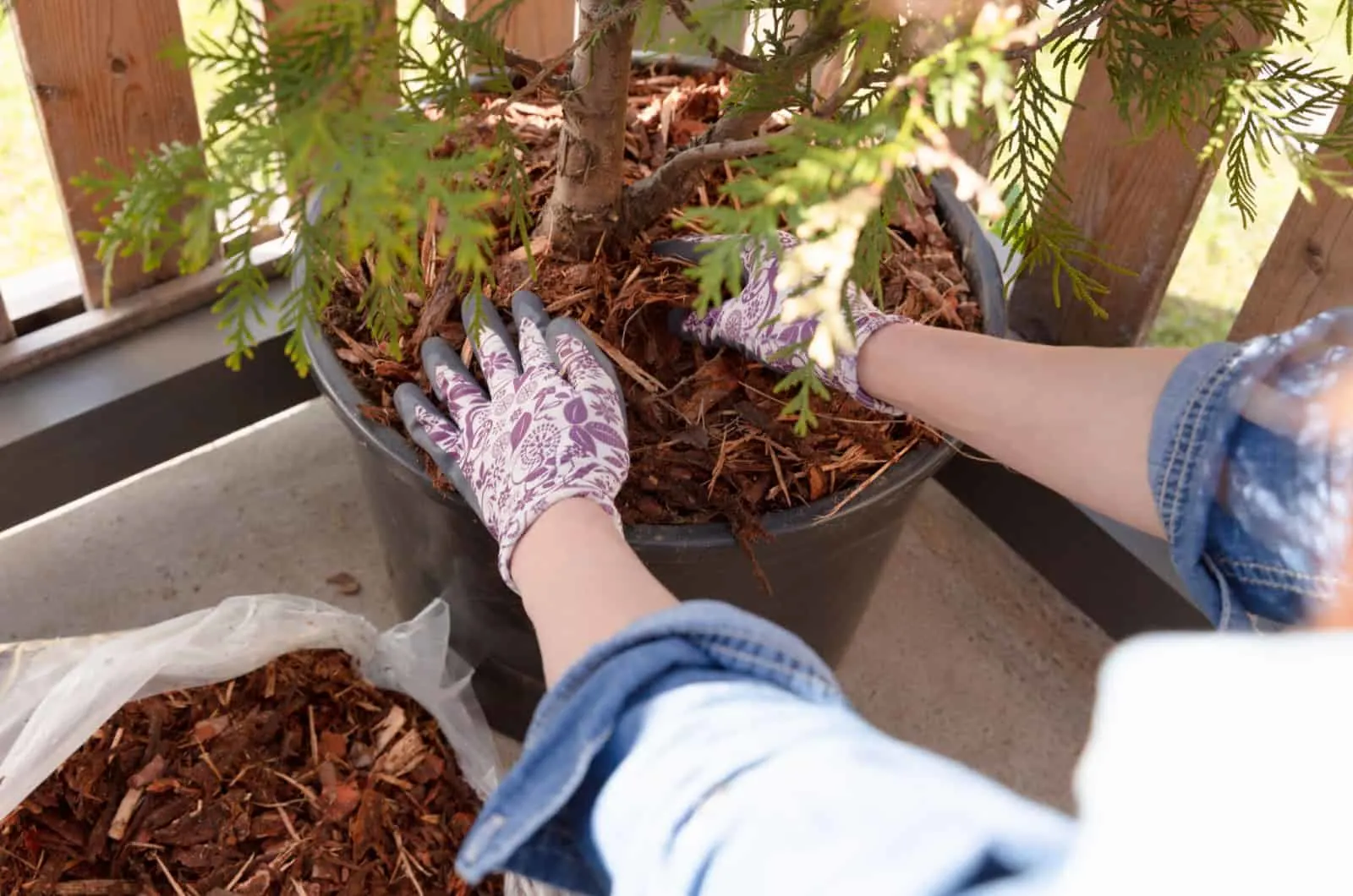
Benefits of Mulching Potted Plants
Mulching potted plants is a crucial practice that offers several benefits to ensure healthy and thriving growth. Whether you’re an avid gardener or just starting out, understanding why mulching is essential will help you make informed decisions for your potted plants.
Providing necessary nutrients for healthy growth
One of the primary benefits of mulching potted plants is the provision of necessary nutrients. Mulch acts as a natural nutrient source, enriching the soil and promoting healthy plant growth. As organic mulches break down over time, they release valuable nutrients into the soil, ensuring that your plants have access to the elements they need to thrive.
Enhancing aesthetic appeal
Mulching potted plants also adds an aesthetic appeal to your garden or indoor plant collection. By covering the bare soil in your pots with a layer of mulch, you can create a more visually pleasing and cohesive look. Mulch comes in various colors and textures, allowing you to customize the appearance of your potted plants and uplift the overall ambiance.
Helping retain moisture in the soil
Proper moisture retention is vital for the health of potted plants, and mulching plays a significant role in achieving this. Mulch acts as a protective barrier, preventing excessive water evaporation from the soil. This means that the moisture levels in the soil remain more stable, reducing the frequency of watering needed for your potted plants. Additionally, mulch helps to insulate the roots from extreme temperatures, providing a more conducive environment for optimal growth.
Types of Organic Mulches
When it comes to choosing the right mulch for your potted plants, organic options are generally recommended. Organic mulches break down over time, providing additional benefits to the soil and plants. Here are some common types of organic mulches you can consider:
Grass clippings
Grass clippings make an excellent organic mulch option, especially if you practice regular lawn maintenance. They release nutrients as they break down and help retain moisture in the soil. However, ensure that the grass clippings you use have not been treated with any herbicides or pesticides, as these can negatively impact your potted plants.
Hay
Hay can also be utilized as mulch for potted plants, but it requires some preparation. Cut the hay into smaller pieces to avoid matting, which can hinder water penetration and airflow. Hay mulch provides good insulation and weed suppression, making it an effective choice for potted plants.
Straw
Straw is another organic mulch option to consider. However, be cautious as it may contain wheat seeds that can germinate in your pots. To prevent this, choose straw that has been processed or composted, or be prepared to remove any sprouting wheat seedlings.
Wood chips
Wood chips are popular for their aesthetic appeal, providing a natural and earthy look to your potted plants. They decay slowly, making them a long-lasting mulch option. However, if you’re using fresh wood chips, bear in mind that the decomposition process may temporarily deplete nitrogen levels in the soil, which could affect plant growth. To counteract this, consider adding a nitrogen-rich fertilizer when using wood chips as mulch.
Cardboard
Cardboard is a convenient and effective mulch option, particularly for potted plants with woody stems. It helps suppress weeds and improves moisture retention. To use cardboard as mulch, remove any tape or stickers and cut it into pieces that can cover the soil around your potted plants.
Newspaper
Newspaper can also be used as mulch, though it may not retain moisture as effectively as other options. It serves as a weed suppressant and can be placed in layers around the base of your potted plants. To maximize its efficiency, wet the newspaper before applying it as mulch.
Leaves
Leaves are a fantastic organic mulch option, particularly in the fall when a plethora of them is available. They provide insulation, retain moisture, and decay quickly, releasing nutrients back into the soil. Shredded leaves work especially well as mulch, as they break down more efficiently.
Pine needles
Pine needles can be used as mulch; however, their use is subject to certain considerations. Pine needles raise soil acidity, making them suitable for acid-loving plants but less ideal for plants that thrive in more alkaline environments. Additionally, their long-lasting nature makes them an excellent choice for mulching potted plants.
Compost
Compost that is produced from organic materials, such as yard waste and plant trimmings, can be used as mulch. This nutrient-rich option enhances soil fertility and improves overall plant health. However, avoid using compost made from kitchen scraps, as they may contain pests, diseases, or weed seeds.
Rubber
While rubber mulch is commonly used in landscaping, it is not recommended for potted plants. Rubber mulch lacks the benefits provided by organic options, such as nutrient enrichment and moisture retention. Additionally, rubber mulch may contain chemicals that can leach into the soil and potentially harm your plants. It’s best to steer clear of rubber mulch when mulching your potted plants.
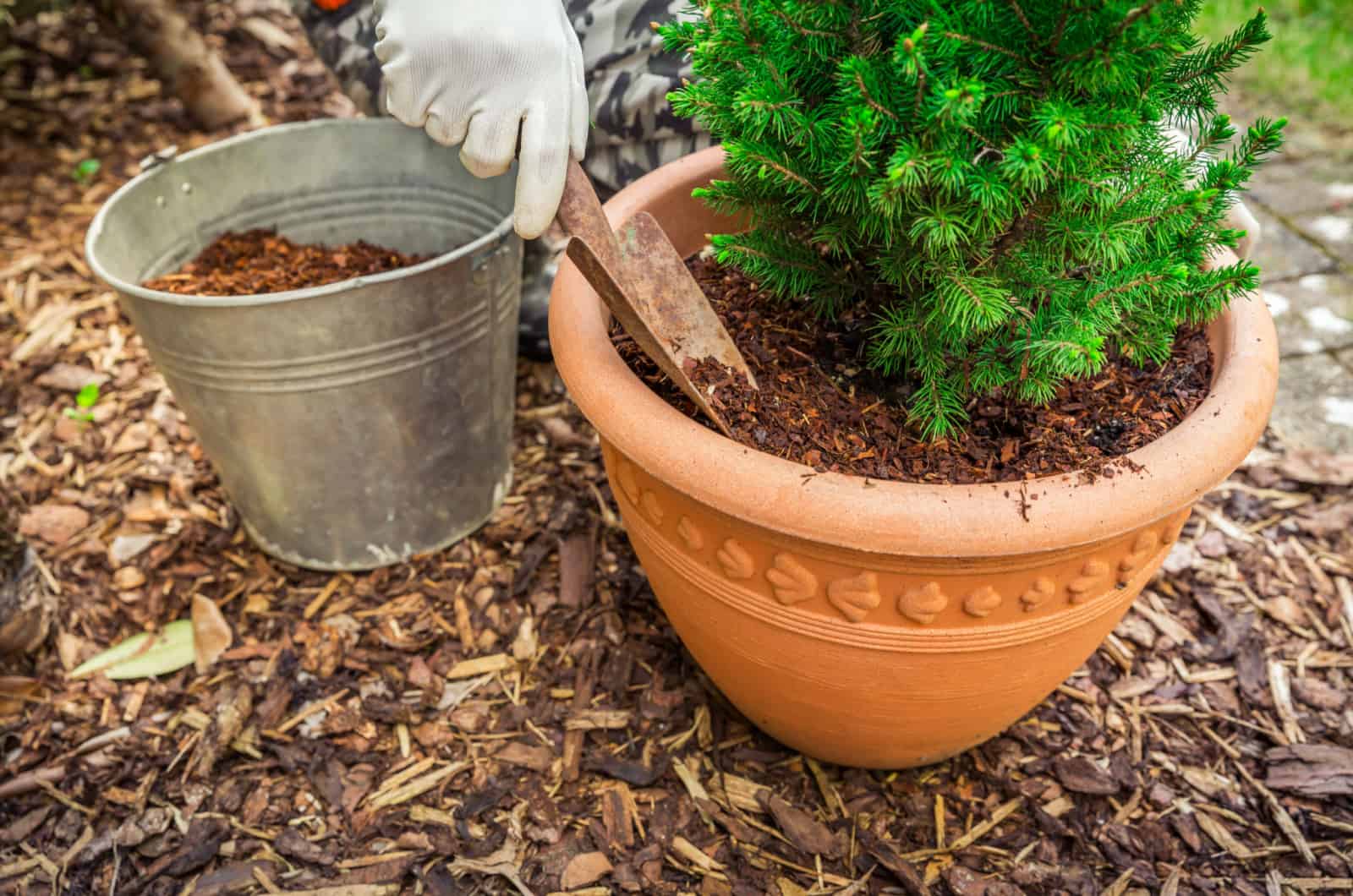
Benefits and Considerations of Different Mulch Options
When selecting the most suitable mulch for your potted plants, it’s important to weigh the benefits as well as any potential considerations associated with each option. Here’s a breakdown of the advantages and considerations for some common mulch options:
Grass clippings
- Benefits: Grass clippings release nutrients and retain moisture in the soil.
- Considerations: Avoid using grass clippings treated with herbicides or pesticides, as they can harm your potted plants.
Hay
- Benefits: Hay is a good organic mulch option that provides insulation and suppresses weeds.
- Considerations: Cut hay into smaller pieces to prevent matting, which can hinder water penetration and airflow.
Straw
- Benefits: Straw offers weed suppression and moisture retention properties.
- Considerations: Straw may contain wheat seeds, so opt for processed or composted straw to prevent wheat seedlings from germinating.
Wood chips
- Benefits: Wood chips provide aesthetic appeal and long-lasting mulching.
- Considerations: Fresh wood chips may temporarily deplete nitrogen levels in the soil, so consider supplementing with a nitrogen-rich fertilizer.
Cardboard
- Benefits: Cardboard serves as an effective weed suppressant and helps improve moisture retention.
- Considerations: Remove any tape or stickers from the cardboard before using it as mulch.
Newspaper
- Benefits: Newspaper is a readily available and cost-effective mulch option that helps suppress weeds.
- Considerations: Wet the newspaper before applying it as mulch to maximize its moisture retention capabilities.
Leaves
- Benefits: Leaves retain moisture, improve insulation, and release nutrients as they decay.
- Considerations: Shredded leaves break down more efficiently and evenly, providing optimal mulching benefits.
Pine needles
- Benefits: Pine needles have excellent longevity, provide insulation, and can enhance soil acidity for acid-loving plants.
- Considerations: Avoid using pine needles for plants that prefer alkaline environments.
Compost
- Benefits: Compost enriches the soil with valuable nutrients and improves overall plant health.
- Considerations: Use compost made from organic materials, avoiding kitchen scraps that may contain pests, diseases, or weed seeds.
Plastic mulch
- Benefits: Plastic mulch effectively suppresses weeds and can help warm the soil in cooler climates.
- Considerations: Plastic mulch may dry out the soil more quickly and should be used with caution, especially in hot and arid regions.
Rubber mulch
- Considerations: Rubber mulch lacks the benefits provided by organic mulches and may contain chemicals that can harm your plants. It is best to avoid using rubber mulch when mulching your potted plants.
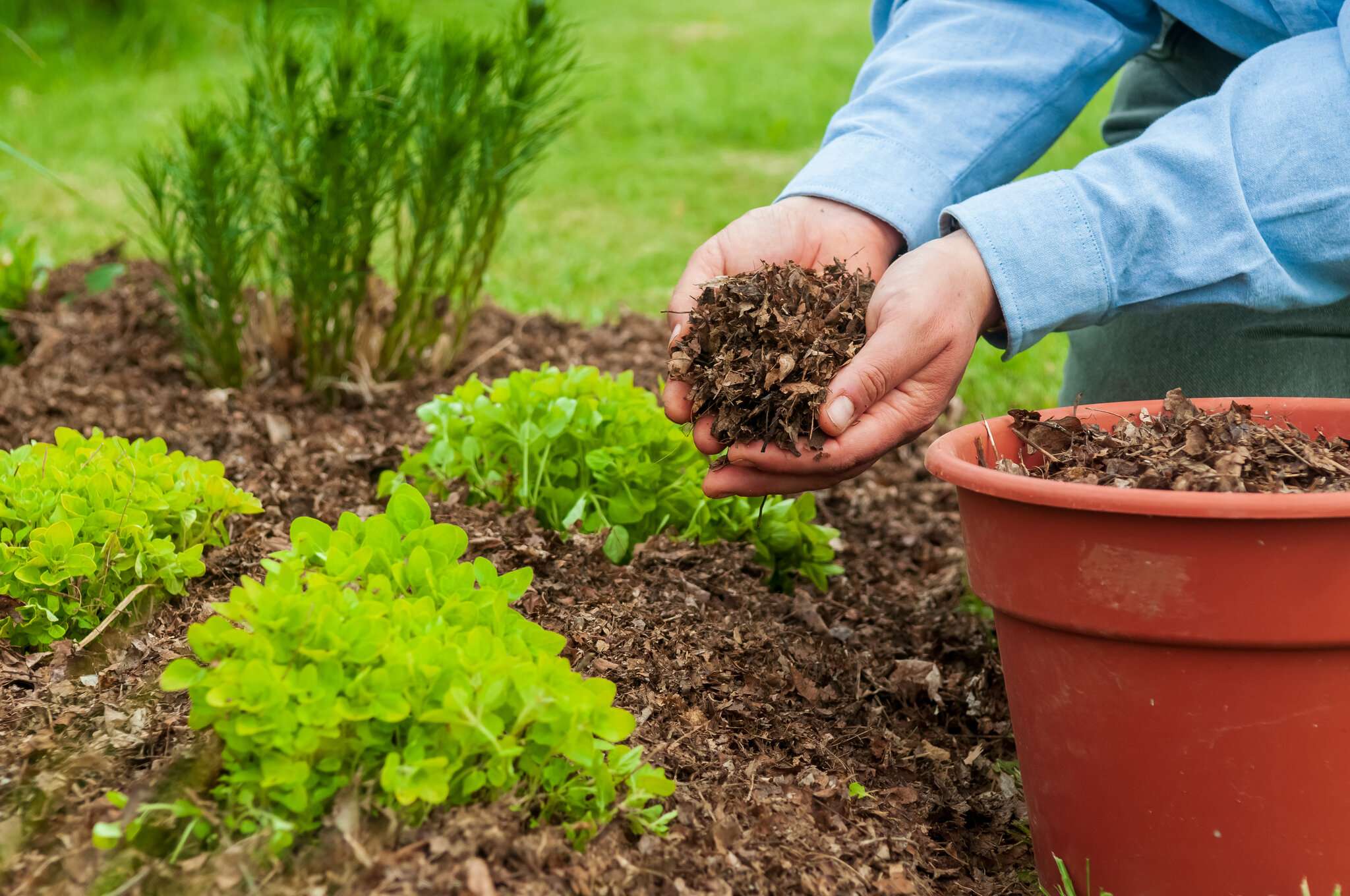
Best Practices for Mulching Potted Plants
While mulching potted plants offers numerous benefits, it’s essential to follow best practices to maximize these advantages and ensure your plants thrive. Consider the following guidelines when mulching your potted plants:
Choosing the appropriate mulch based on climate
Consider your climate when selecting the mulch for your potted plants. In hot and arid regions, materials that retain moisture well, such as wood chips or straw, may be more suitable. Conversely, in cooler climates, plastic mulch can help warm the soil, promoting optimal plant growth.
Considering the plant type
Different plants have varying preferences when it comes to moisture levels and acidity. Take into account the specific needs of your potted plants and choose a mulch option that aligns with those requirements. For example, acid-loving plants may benefit from pine needles, while plants that thrive in alkaline environments may not.
Determining whether the plants are indoor or outdoor
The location of your potted plants, whether indoors or outdoors, can influence the choice of mulch. Indoor plants may benefit from mulches that retain moisture well, while outdoor plants may require mulches that provide good insulation and weed suppression.
Ensuring proper watering of the mulch
While mulch helps retain moisture in the soil, it’s important to remember that water should still reach the roots of your potted plants. Water the mulch layer along with the plant to ensure it remains moist and continues to serve its purpose. Strike a balance between keeping the mulch moist without overwatering your plants.
Keeping the mulch away from the plant’s stem
When applying mulch to your potted plants, avoid placing it directly against the plant’s stem. This helps prevent moisture buildup and potential rot or insect infestations. Leave a gap between the mulch and the stem to allow for proper airflow and prevent any adverse effects on plant health.
By incorporating these best practices, you can ensure that the benefits of mulching are maximized for your potted plants. From providing necessary nutrients to enhancing the aesthetic appeal and retaining moisture in the soil, mulching is a valuable technique for any potted plant enthusiast. Selecting the appropriate mulch based on climate, plant type, and indoor/outdoor considerations, combined with proper watering and maintenance, will contribute to the overall health and vitality of your potted plants. So, grab your mulch of choice and get ready to transform your potted plant collection into a thriving and visually stunning oasis!

